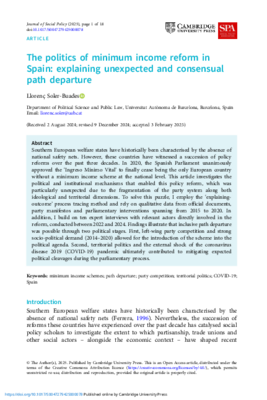The politics of minimum income reform in Spain: explaining unexpected and consensual path departure

2025
Early View
1-18
minimum wage ; income distribution ; social policy ; trade union attitude ; political aspect
Wages and wage payment systems
https://doi.org/10.1017/S0047279425000078
English
Bibliogr.
"Southern European welfare states have historically been characterised by the absence of national safety nets. However, these countries have witnessed a succession of policy reforms over the past three decades. In 2020, the Spanish Parliament unanimously approved the ‘Ingreso Mínimo Vital' to finally cease being the only European country without a minimum income scheme at the national level. This article investigates the political and institutional mechanisms that enabled this policy reform, which was particularly unexpected due to the fragmentation of the party system along both ideological and territorial dimensions. To solve this puzzle, I employ the ‘explaining-outcome' process tracing method and rely on qualitative data from official documents, party manifestos and parliamentary interventions spanning from 2015 to 2020. In addition, I build on ten expert interviews with relevant actors directly involved in the reform, conducted between 2022 and 2024. Findings illustrate that inclusive path departure was possible through two political stages. First, left-wing party competition and strong socio-political demand (2014–2020) allowed for the introduction of the scheme into the political agenda. Second, territorial politics and the external shock of the coronavirus disease 2019 (COVID-19) pandemic ultimately contributed to mitigating expected political cleavages during the parliamentary process."
This is an Open Access article, distributed under the terms of the Creative Commons Attribution licence (https://creativecommons.org/licenses/by/4.0/), which permits unrestricted re-use, distribution and reproduction, provided the original article is properly cited.
Digital
The ETUI is co-funded by the European Union. Views and opinions expressed are however those of the author(s) only and do not necessarily reflect those of the European Union or the ETUI.